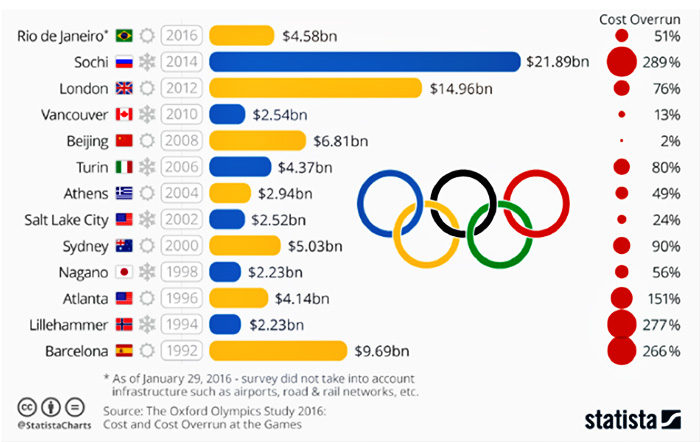
International observers (as recently as the middle of last week) doubted that the Rio organizers could pull off the significant last-minute details that were required for a successful games. There have been numerous mishaps, some unfortunately fatal, but none appear as though they will derail Rio’s Olympics. And despite the still massive costs of hosting the Olympics, Rio’s organizers pulled it off at a relatively lower total cost than other Olympic host cities and countries.
It was surprising to some that 95% of Rio’s athletic venues were in reasonably good shape as the games opened. Perhaps the sentiment expressed by an unidentified Rio businessman interviewed last week was true, “Brazilians start slow but finish fast.”
Said Vox last week about the going-in challenges facing Brazil and its Olympic organizers:
“The concerns about Rio de Janeiro’s readiness are understandable: Brazil has the unenviable task of hosting an Olympics at the intersection of more crises than many nations see in a decade. The good news is that the Games themselves probably won’t seem like a disaster. The bad news is that they could end up worsening Brazil’s already deep problems.
“Rio is struggling even more than other host cities because its economic fortunes have changed dramatically since it won the right to host the games in 2009. Rio began planning the Olympics when Brazil was in the middle of an economic boom. But now it’s hosting them during what could be the worst recession the country has ever experienced. … It’s reasonable to wonder if a country dealing with the triple threat of a deep recession, political instability, and a widespread (Zika) epidemic can really pull off hosting a major international event.”
From a cost perspective, Brazil and Rio appear to be on track to spend far less than the last two Olympics in Sochi and London. But some compromises have been made. For example, says Vox, “The state of Rio had planned to spend $4 billion to clean up the polluted Guanabara Bay, where some events will be held; in the end, it spent just $170 million.”
Still, says Statista, “The organizers have put (in) a huge amount of work and invested an impressive amount of cash to get to this point. … Costs ran 51 percent over budget in Rio, ending up at $4.58 billion. Even though that may seem like a huge amount of money, it pales in comparison to the Winter Olympics in Sochi in 2014. Costs there quickly snowballed with many venues coming in catastrophically over budget. … Hosting the Olympics is expensive with the people of Hamburg (Germany) voting to withdraw their city’s bid for the 2024 games in late 2015, primarily on funding grounds.”
FIGURE 1: THE MASSIVE COSTS BEHIND THE OLYMPIC GAMES
Cost of hosting the Olympic Games since 1992 (billions U.S. dollars)

On an ironic note, Bloomberg recently headlined a story, “No One Told Brazil Markets That Rio Olympics Would Be a Disaster.” They were referring to the fact that Brazil’s “benchmark stock index and currency are near the highest in more than a year…amid a rebound in commodities and speculation that stimulus in developed markets will make Brazil’s higher interest rates more attractive to foreign investors.” Bloomberg also noted that Brazil’s Ibovespa has jumped over 30 percent in 2016, the top performer among BRIC (Brazil, Russia, India, China) countries through early August.
FIGURE 2: 2016 PERFORMANCE OF BRIC COUNTRIES’ EQUITY MARKETS

